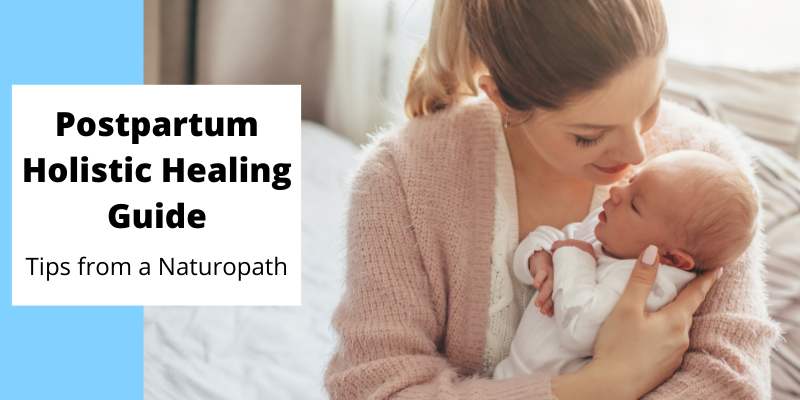7 Min Read
The Postpartum Holistic Healing Guide

Pregnancy and childbirth are life-changing experiences that involve physical, mental and social changes for families. The time after childbirth is known as the postnatal/postpartum period and is also a critical phase in the lives of both moms and newborn babies. The postpartum period is defined as 6-8 weeks following childbirth.
The postpartum period is often a blur as moms are running on changes in hormones and minimal sleep. This is the period when moms are learning how to change diapers, learning how to breastfeed and learning how to take care of the new baby and themselves simultaneously. It is a stressful yet exciting time in a woman’s life. Major changes occur during this period that ultimately determine the well-being of mothers and their babies. Effective postpartum care can help to prevent short and long-term consequences in both mom and baby’s life. Today’s post will provide holistic care options for a healthy postpartum period.
First let's chat a little bit about what happens after childbirth.
Scheduling Postnatal Visits
It is important that new moms and their newborns are attending their check-ups in the postnatal period. Postnatal visits include facilitating healthy breastfeeding practices, screening for postpartum depression, monitoring the newborn’s growth/overall health status and treating any childbirth related complications. The World Health Organization recommends that all women and newborns receive at least 3 postnatal visits following delivery.
- First visit: Within the first week
- Second visit: Between 7-14 days
- Third visit: 4-6 weeks postpartum
If a midwife was chosen during pregnancy, they will do a home visit after birth and help with breastfeeding and baby care until about 6-8 weeks. If an obstetrician was chosen to support pregnancy, they will do a check in at 6 weeks postpartum after which mom and baby will return to one’s family doctor for ongoing care.
Postpartum Struggles
The focus of postpartum care has traditionally been centred around adverse medical events. However, issues related to mental health, parenting adjustment and social isolation are becoming equally as important in the postpartum period. Some mothers and newborns breeze through the postnatal period, while others find it extremely challenging and overwhelming. For example up to 50% of women report tiredness, backache, headaches and perineal wound pain. As well, many women can also experience sore nipples, urinary tract infections, postpartum anxiety and postpartum depression.
Postpartum Blues
Babies need to feed every 1.5-2.5 hours depending on the infant and this makes sleep deprivation for mom a constant struggle. The needs of a newborn within the first 12 weeks are quite intense. Women will often feel more perineal pain at 5 weeks postpartum because they are doing a lot and not resting enough. Depression following birth can range from the “baby blues” to postpartum depression to more serious postpartum psychosis. Postpartum blues can affect 75-80% of women and usually starts between days 3-5 postpartum when the mature milks start to come in. It happens due to hormonal changes (drop in both estrogen and progesterone). It usually resolves by Day 10 - Day 14. Postpartum blues can show up as tearfulness, low spirit, anxiety, over emotional, tiredness and being forgetful. 10-15% of women will experience something more severe than postpartum blues, known as postpartum depression. It is defined as depression occurring within the first year following the birth of a child. Most women will experience this within the first 12 weeks post birth. Symptoms can include:
- Insomnia
- Confusion
- Guilt
- Dysphoria
- Emotional lability
It is important to recognize the signs of postpartum depression and seek help when needed. Many moms will experience postpartum blues and talking about it can help to reduce the feelings of loneliness.
Those weeks after childbirth are extremely exciting yet extremely scary at the same time. Take a read through some holistic approaches to stay healthy and happy during the postpartum period!
6 Natural Tips For A Healthy Postpartum Period
1. Good Postpartum Nutrition
The body has undergone many changes during pregnancy and birth. A healthy diet can help one recover quicker as well as help support breastfeeding. Caloric intake should not fall below 1,800 calories/day and 500 calories should be added if breastfeeding. Many moms are worrying about weight loss post birth, but it is important to remember that the weight will come off. After birth it is crucial to focus on good nutrition. Since many moms are tired or busy it is important to plan simple healthy meals.
Aim to eat more:
- Greens
- Antioxidant-rich foods like, pomegranate, goji berries, turmeric, cinnamon, chia seeds, dark chocolate, hemp hearts
- Healthy fats - olive oil, avocado, nuts and seeds
- Lots and lots of fiber (ex. Legumes, flax seed, chia seeds, hemp seeds)
2. Find a Pelvic Floor Physiotherapist
Delivering a baby, whether vaginally or by C-section can stretch, strain and often tear the muscles of the pelvic floor. Without proper rehabilitation of the muscles, new mamas can develop urinary incontinence, low back pain, pain with intercourse and pelvic organ prolapse, when supportive structures in the pelvic floor become too relaxed and can allow the bladder, uterus or rectum to bulge into the vagina. A pelvic floor physio can help to strengthen the pelvic floor muscles and help to return the body to normal function after your 6 week checkup postpartum. Prenatal pelvic floor physiotherapy can also help to prepare the pelvic floor for delivery of the baby while preventing or limiting any damage.
3. Keep your bowel movements regular and soft
Irregular sleep, hormone imbalances and stress can negatively affect the bowels leading to constipation. Constipation can be especially problematic after birth because the abdominal and pelvic floor muscles are still in recovery. So make sure to be diligent with water consumption. Aim for 2-3 L per day. Next, try to get about 30 grams of fiber a day through eating lots of fruits and vegetables, soluble fiber (nuts, seeds, beans, lentils,) and insoluble fiber (whole grains, nuts, kidney beans). Lastly, taking a magnesium supplement before bed as this can help to keep the stools soft and helps to relax before bed!
4. Sitz Baths
Most women who have vaginal deliveries tend to have trauma in the perineal region. Sitz baths provide some time to yourself but can also help to soothe the perineal area.
Steps:
- Add warm water to a bathtub
- Add some soaking salts (ie. epsom salt)
- Soak in the tub for about 20 minutes
5. Supplementation
Most women get counselled on what to be taking during pregnancy but often there is a gap in knowledge in terms of what supplements to continue taking or start taking after childbirth. Here is a list of some important nutrients to take after delivery:
- Prenatal Vitamin- During pregnancy and breastfeeding, the growing baby places a high demand on mom’s nutrients. Thus, women are more likely to be deficient in essential nutrients like B vitamins, magnesium, calcium, iron and fatty acids. Replenishing these stores through good dietary choices and supplementing with a good prenatal can be very helpful.
- Iron - Did you know that iron deficiency is the most common nutritional deficiency in women? Blood loss after birth due to postpartum hemorrhage and c-section will cause iron stores to decrease. So, it is important to get your iron levels checked before pregnancy, but equally as important to get them checked after pregnancy. Iron supplementation can continue 3 months after birth.
- Omega 3 Fish Oil - Generally women have been on this for their entire pregnancy but it is especially important to continue this for the first 3 months postpartum for mom and for infant brain development.
- Calcium - Did you know that the body will steal calcium from the bones to ensure there is enough in breast milk for the baby? Moms need an extra 250 mg of calcium per day atop of the 1000 mg per day moms should be getting from the diet.
6. Rest & Recover
The first few weeks with a new baby are very demanding both physically and emotionally. A typical newborn baby wakes up every 3 hours and needs to be fed, changed and comforted. So make sure to sleep when your baby sleeps. Women need to rest and take care of themselves as they recover from labour and birth. This requires family members and friends to help out. It is important to identify ways the support system around can help out.
Babies bring so much joy and excitement into a new mom’s life. They also bring a whole new set of challenges and change in family dynamics. Labour and childbirth are physically demanding as is breastfeeding and looking after a newborn baby. It is very important that women regain their strength and work to maintain their own health while adjusting to their new life with their new baby. Creating a team of people around you can help provide both short-term and long-term support. If you are a new mom, seek support when you need it.
** Disclaimer: The advice in this article is for informational purposes only. It does not replace the care of a Naturopathic physician**
References:
- Haran, C., Van Driel, M., Mitchell, B.L. et al. Clinical guidelines for postpartum women and infants in primary care–a systematic review. BMC Pregnancy Childbirth 14, 51 (2014). https://doi.org/10.1186/1471-2393-14-51
- Heidi Murkoff & Sharon Mazel. 2016. What to Expect - The First year.
- Counselling for maternal and newborn health care. 2013. World Health Organization


